The Kongo Kingdom...A underrated Kingdom - Culture - Nairaland
Nairaland Forum / Nairaland / General / Culture / The Kongo Kingdom...A underrated Kingdom (22406 Views)
How I Will Rule My Kingdom — 17 Yr Old Delta King / Benin Kingdom In Edo Is Yoruba Territory — Ooni Of Ife, Adeyeye Ogunwusi / Photos From An Unclad Annual Virgin Dance That Holds In Abiriba Kingdom (2) (3) (4)
(1) (2) (3) (4) (5) (Reply) (Go Down)
| The Kongo Kingdom...A underrated Kingdom by Nobody: 10:35pm On Mar 23, 2013 |
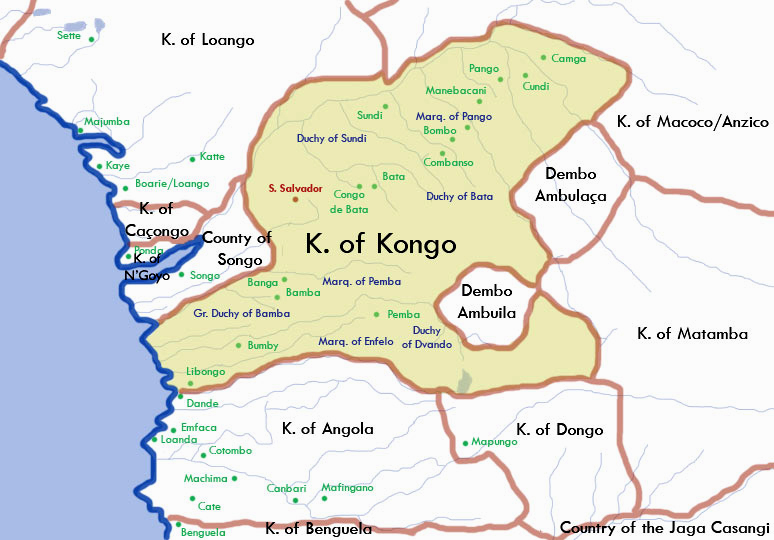 I'm making this thread because this Kingdom appears to be very underrated and some people seem to not notice the significance of this Kingdom. Not only that, but some people even think the 'Bantu' people of this area were 'uncivilized' and 'savages', but we'll just see about that.  Anyways...Lets get started. 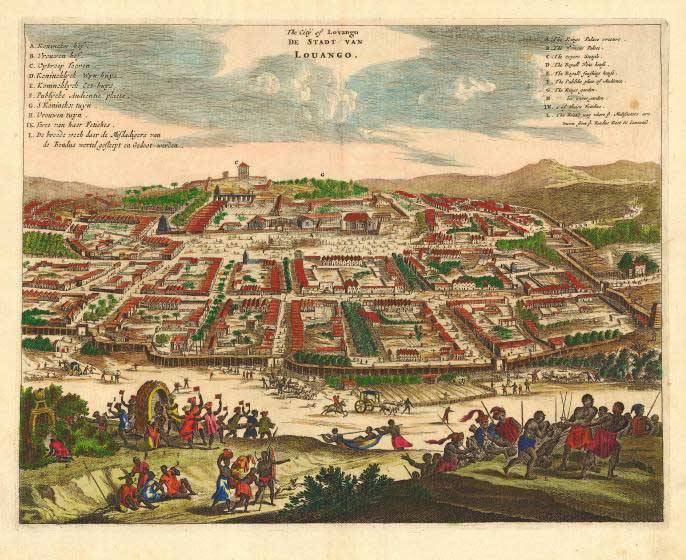 African Treasures http://i1355.photobucket.com/albums/q701/Matthews1986/4496239227_1df344482e_zps5d15c2de.jpg 17th century painting of the dutch painter Albert Eckhout showing two emissaries of the Kingdom of Kongo in Brazil holding the two main sources of wealth in west africa, an ivory tusk and a jewel box. African Nobleman http://i1355.photobucket.com/albums/q701/Matthews1986/4496875722_94844ce0f0_zps467ac27e.jpg 17th century painting of the dutch painter Albert Eckhout showing the nobleman Don Miguel de Castro[b] from the Kingdom of Kongo during a commercial trip to the portuguese colony of Brazil.[/b] African King http://i1355.photobucket.com/albums/q701/Matthews1986/4496762748_1013e5b252_zpsdd5f5c25.jpg illustration showing the king Afonso I of Kongo, ruler of the Kingdom of Kongo in the first half of the 16th century. Afonso is best known for his vigorous attempt to convert Kongo to a Catholic country, by establishing the Roman Catholic Church in Kongo, providing for its financing from tax revenues, and creating schools. By 1516 there were over 1000 students in the royal school, and other schools were located in the provinces, eventually resulting in the development of a fully literate noble class. M'banza-Kongo M'banza-Kongo was once the home of the Manikongo, the ruler of the Kingdom of Kongo, which at its peak reached from southern Africa's Atlantic coast to the Nkisi River. The earliest documented kings referred to their city in their correspondence as "the city of Congo" (cidade de Congo), and the name of the city as São Salvador appears for the first time in the letters of Álvaro I (1568–1587) and was carried on by his successors. The name was changed back to "City of Kongo" (Mbanza Kongo) after Angolan independence in 1975. When the Portuguese arrived in Kongo, Mbanza Kongo was already a large town, perhaps the largest in sub-equatorial Africa, and an early visitor of 1491 compared it in size to the Portuguese town of Évora. During the reign of Afonso I, stone buildings were added, including a palace and several churches. The town grew substantially as the kingdom of Kongo expanded and grew, and an ecclesiastical statement of the 1630s related that 4,000-5,000 baptisms were performed in the city and its immediate hinterland (presumably the valleys that surround it), which is consistent with an overall population of 100,000 people. Of these, perhaps 30,000 lived on the mountain and the remainder in the valleys around the city. Among its important buildings were some twelve churches, including São Salvador, as well as private chapels and oratories and an impressive two-story royal palace, the only such building in all of Kongo, according to the visitor Giovanni Francesco da Roma (1648). The city was sacked several times during the civil wars that followed the battle of Mbwila (or Ulanga) in 1665, and was abandoned in 1678. It was reoccupied in 1705 by Dona Beatriz Kimpa Vita's followers and restored as Kongo's capital by King Pedro IV of Kongo in 1709. It was never again depopulated though its population fluctuated substantially during the eighteenth and nineteenth century. M'banza Kongo is known for the ruins of its 16th century cathedral (built in 1549). http://i1355.photobucket.com/albums/q701/Matthews1986/Kongocapital_zpsc58b115b.jpg The capital of the Kingdom of Kongo |
| Re: The Kongo Kingdom...A underrated Kingdom by Nobody: 10:41pm On Mar 23, 2013 |
Continued...  llustration of the ruler of Loango, from Dapper's Description of Africa (1668) Earliest human settlement, in what is now the DRC, stretches back some 10 000 years. The earliest settlers were in all likelihood short statured hunter-gathers, now known (though controversially so) as pygmies. Some 1 300 years ago these Stone Age peoples were followed by Bantu and Nilotic speaking hunter-gatherer groups, who settled initially in the northern savannah areas. In time the new-comers adopted or developed the cultivation of tropical crops, cattle husbandry and iron working technology which enabled them to subdue and displace the original pygmy populations, gradually driving them into the mountains and the thicker parts of the rain forest. In the Congo area a number of extensive and complex trading states emerged in the savannah; the Kongo kingdom, the Luba Empire, the Lunda kingdom, the Zande kingdoms, and the kingdom of Kuba. While chiefdoms did emerge within the rainforests, they never rivaled the savannah states for size and complexity.  The Kingdom of Kongo (1400– 1914) The first of these, the Kongo kingdom, was founded by invaders from the north east who settled south of the Congo River in the late 1300s and grew to encompass the north of modern Angola and the western areas of the DRC (Library of Congress 1993) Foundation of the Kingdom The first king of the Kingdom of Kongo Dya Ntotila was Lukeni lua Nimi (circa 1280-1320).The name Nimi a Lukeni appeared in later oral traditions and some modern historians, notably Jean Cuvelier, popularized it. Lukeni lua Nimi or Nimi a Lukeni, became the founder of Kongo when he conquered the kingdom of the Mwene Kabunga (or Mwene Mpangala), which lay upon a mountain to his south. He transferred his rule to this mountain, the Mongo dia Kongo or "mountain of Kongo", and made Mbanza Kongo, the town there, his capital. Two centuries later the Mwene Kabunga's descendants still symbolically challenged the conquest in an annual celebration. The rulers that followed Lukeni all claimed some form of relation to his kanda or lineage and were known as the Kilukeni. The Kilukeni kanda or "house" as recorded in Portuguese documents would rule Kongo unopposed until 1567. After the death of Nimi a Lukeni, his brother, Mbokani Mavinga, took over the throne and ruled until approximately 1367. He had two wives and nine children. His rule saw an expansion of the Kingdom of Kongo to include the neighbouring state of Loango and other areas now encompassed by the current Republic of Congo. The Mwene Kongos often gave the governorships to members of their family or its clients. As this centralization increased, the allied provinces gradually lost influence until their powers were only symbolic, manifested in Mbata, once a co-kingdom, but by 1620 simply known by the title "Grandfather of the King of Kongo" (Nkaka'ndi a Mwene Kongo). The high concentration of population around Mbanza Kongo and its outskirts played a critical role in the centralization of Kongo. The capital was a densely settled area in an otherwise sparsely populated region where rural population densities probably did not exceed 5 persons per square kilometer. Early Portuguese travelers described Mbanza Kongo as a large city, the size of the Portuguese town of Évora as it was in 1491. By the end of the sixteenth century, Kongo's population was probably close to half a million people in a core region of some 130,000 square kilometers. By the early seventeenth century the city and its hinterland had a population of around 100,000, or one out of every five inhabitants in the Kingdom (according to baptismal statistics compiled by Jesuit priests). This concentration allowed resources, soldiers and surplus foodstuffs to be readily available at the request of the king. This made the king overwhelmingly powerful and caused the kingdom to become highly centralized. 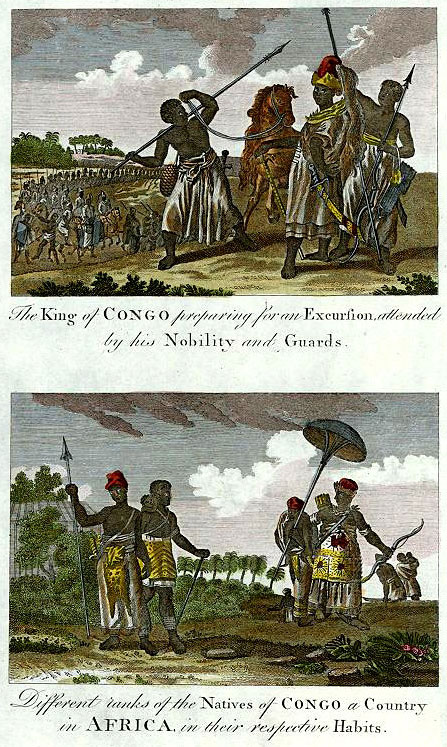  [img]http://2.bp..com/_3QjEBQanMKA/SgOcMGkcL8I/AAAAAAAAAFQ/bTSz3T0Fgj4/s1600/Catholic+Missionary+and+his+Entourag%20e,+Sogno,+Kingdom+of+Kongo,+1740s+++Paola+Collo+and+Silvia+Benso+,Sogno+Bamba,+Pemba,+Ovando++(Milan,+1986).jpg[/img] By the time of the first recorded contact with the Europeans, the Kingdom of Kongo was a highly developed state at the center of an extensive trading network. Apart from natural resources and ivory, the country manufactured and traded copperware, ferrous metal goods, raffia cloth, and pottery. The Kongo people spoke in the Kikongo language. The eastern regions, especially that part known as the Seven Kingdoms of Kongo dia Nlaza (or in Kikongo Mumbwadi or "the Seven"  , were particularly famous for the production of cloth. , were particularly famous for the production of cloth.The Luba state coalesced some 100 years after the Kongo and to the east of it, in the upper reaches of the Lualaba River, around lakes Upemba and Kisale. The Lunda kingdom emerged 15th century through the unification of its composite chiefdoms in the south west on the patterns laid down by their Luba neighbours. In the sixteenth century its territory was overrun by the expanding Luba empire, and, unable to resist the invaders, some of the Lunda migrated to Angola where they founded new states. The kingdom of Kuba was founded to the north of the Kasai River, and of its tributary the Sankura, by invaders from the west in about 1600. The complex forest-river-savannah ecology of its territory enabled it to develop into a vigorous trading state that was able to maintain its integrity until it fell to the advance of Belgian colonial expansion (Giblin 1999) |
| Re: The Kongo Kingdom...A underrated Kingdom by Nobody: 10:44pm On Mar 23, 2013 |
Continued... Nzinga Mbemba (Afonso I), Letters to the King of Portugal (1526) The Portuguese were the first European power to begin actively exploring the coastline of Africa. In their quest to reach the valuable trade routes of the Indian Ocean, they established a number of fortified bases and trading outposts southward along the western coast of Africa in the late 15th century. Contact between Portugal and the west African kingdom of Kongo began in 1483; for several decades ambassadors, trade goods, and ideas flowed in both directions between the two states. However, over time the increasing presence and eventual dominance of Europeans, their products, and their promotion of slavery severely disrupted Kongolese society. In 1526, the king of the Kongo, Nzinga Mbemba (who by this time had adopted the Christian name of Afonso I) began writing a series of letters to the Portuguese King Jo�o III, appealing for an end to the slave trade. Twenty-four letters were written in all -- three are reproduced here. Sir, Your Highness should know how our Kingdom is being lost in so many ways that it is convenient to provide for the necessary remedy, since this is caused by the excessive freedom given by your agents and officials to the men and merchants who are allowed to come to this Kingdom to setup shops with goods and many things which have been prohibited by us, and which they spread throughout our Kingdoms and Domains in such an abundance that many of our vassals, whom we had in obedience, do not comply because they have the things in greater abundance than we ourselves; and it was with these things that we had them content and subjected under our vassalage and jurisdiction, so it is doing a great harm not only to the service of God, but the security and peace of our Kingdoms and State as well. And we cannot reckon how great the damage is, since the mentioned merchants are taking every day our natives, sons of the land and the sons of our noblemen and vassals and our relatives, because the thieves and men of bad conscience grab them wishing to have the things and wares of this Kingdom which they are ambitious of, they grab them and get them to be sold; and so great, Sir, is the corruption and licentiousness that our country is being completely depopulated, and Your Highness should not agree with this nor accept it as in your service. And to avoid it we need from those Kingdoms no more than some priests and a few people to reach in schools, and no other goods except wine and flour for the holy sacrament, That is why we beg of Your Highness to help and assist us in this matter, commanding your factors that they should nor send here either merchants or wares, because it is our will that in these Kingdoms there should not be any trade of slaves nor outlet for them. Concerning what is referred to above, again we beg of Your Highness to agree with it, since otherwise we cannot remedy such an obvious damage, Pray Our Lord in His mercy to have Your Highness under His guard and let you do forever the things of His service, I kiss your hands many times. At our town of Kongo, written on the sixth day of July; Jo�o Teixeira did it in 1526, The King, Dom Afonso. {On the back of this letter the following can be read: To the most powerful and excellent prince Dow Jo�o, King our Brother.} Moreover, Sir, in our Kingdoms there is another great inconvenience which is of little service to God, and this is that many of our people, keenly desirous as they are of the wares and things of your Kingdoms, which are brought here by your people, and in order to satisfy their voracious appetite, seize many of our people, freed and exempt men, and very often it happens that they kidnap even noblemen and the sons of noblemen, and our relatives, and take them to be sold to the white men who are in our Kingdoms; and for this purpose they have concealed them; and others are brought during the night so that they might not be recognized. And as soon as they are taken by the white men they are immediately ironed and branded with fire, and when they are carried to be embarked, if they are caught by our guards' men the whites allege that they have bought them but they cannot say from whom, so that it is our duty to do justice and to restore to the freemen their freedom, but it cannot be done if your subjects feel offended, as they claim to be. And to avoid such a great evil we passed a law so that any white man living in our Kingdoms and wanting to purchase goods in any way should first inform three of our noblemen and officials of our court whom we rely upon in this matter, and these are Dom Pedro Manipanza and Dom Manuel Manissaba, our chief usher, and Gon�alo Pires our chief freighter, who should investigate if the mentioned goods are captives or free men, and if cleared by them there will be no further doubt nor embargo for them to be taken and embarked, But if the white men do not comply with it they will lose the aforementioned goods. And if we do them this favor and concession it is for the part Your Highness has in it, since we know that it is in your service too that these goods are taken from our Kingdom, otherwise we should not consent to this� Sir, Your Highness has been kind enough to write to us saying that we should ask in our letters for anything we need, and that we shall be provided with everything, and as the peace and the health of our Kingdom depend on us, and as there are among us old folks and people who have lived for many days, it happens that we have continuously many and different diseases which put us very often in such a weakness that we reach almost the last extreme; and the same happens to our children, relatives and natives owing to the lack in this country of physicians and surgeons who might know how to cure properly such diseases. And as we have got neither dispensaries nor drugs which might help us in this forlornness, many of those who had been already confirmed and instructed in the holy faith of Our Lord Jesus Christ perish and die; and the rest of the people in their majority cure themselves with herbs and breads and other ancient methods, so that they put all their faith in the mentioned herbs and ceremonies if they live, and believe that they are saved if they die; and this is not much in the service of God. And to avoid such a great error and inconvenience, since it is from God in the first place and then from your Kingdoms and from Your Highness that all the good and drugs and medicines have come to save us, we beg of you to be agreeable and kind enough to send us two physicians and two apothecaries and one surgeon, so that they may come with their drugstores and all the necessary things to stay in our kingdoms, because we are in extreme need of them all and each of them. We shall do them all good and shall benefit them by all means, since they are sent by Your Highness, whom we thank for your work in their coming. We beg of Your Highness as a great favor to do this for us, because besides being good in itself it is in the service of God as we have said above. From: Basil Davidson, trans., The African Past, London: Curtis Brown Ltd., 1964. http://www.wadsworth.com/history_d/special_features/ext/world_hist/unbound/product/wawhm01c/content/whis/modules/empire/historicaldocuments/emp_rd_mbemba.htm |
| Re: The Kongo Kingdom...A underrated Kingdom by Nobody: 10:54pm On Mar 23, 2013 |
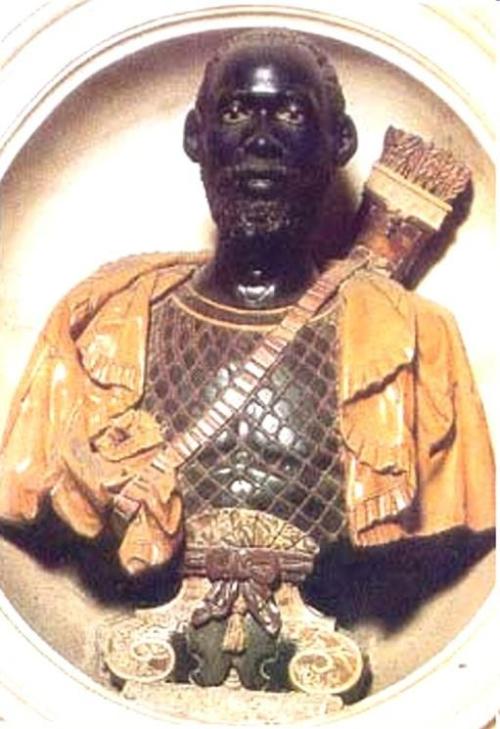 Emanuele Ne Vunda (died 1608), also Antonio Emanuele Ne Vunda, or Antonio Emmanuele Funta, the ambassador from Congo, sent by the king of Congo Alvaro II to Pope Paul V in 1604–1608Ne-Vunda traveled through Brazil and Spain and only reached Rome on 3 January 1608, but he died two days later of illness. 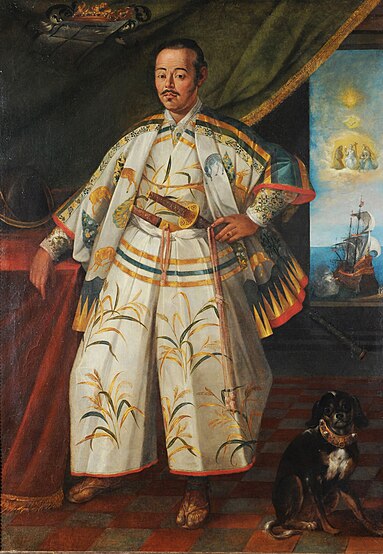 Hasekura Rokuemon Tsunenaga (or "Francisco Felipe Faxicura", as he was baptized in Spain) (1571–1622) In the years 1613 through 1620, Hasekura headed a diplomatic mission to the Vatican in Rome, traveling through New Spain (arriving in Acapulco and departing from Veracruz) and visiting various ports-of-call in Europe. This historic mission is called the Keichō Embassy It is interesting given the wider world context and the eventual different out come of such visitations and contact for while the Japanese subsequently beheaded their Christians converts driving them under ground and throwing out all forigners for the next 200yrs ,the Kongolese allowed the Portuguese continued access and meddling to take root,resulting in the brake-up of their kingdom resulting in war with a very powerful freedom loving Queen named Nizinga 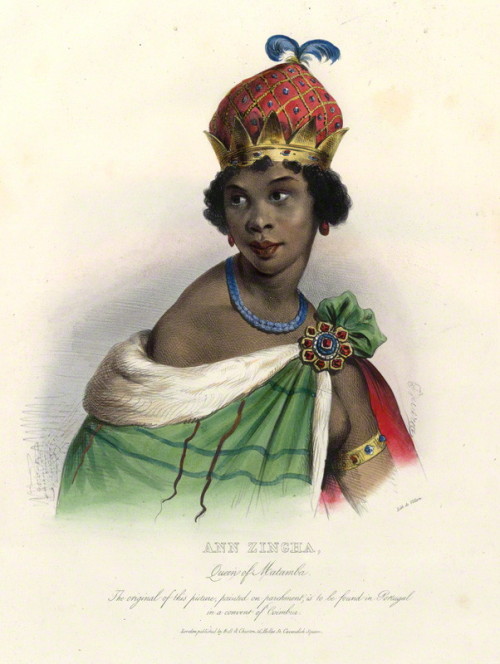 Nzinga of the Ndongo and Matamba Queen Nzingha was born to Ngola (King) Kiluanji and Kangela in 1583. According to tradition, she was named Nzingha because her umbilical cord was wrapped around her neck (the Kimbundu verb kujinga means to twist or turn). It was said to be an indication that the person who had this characteristic would be proud and haughty, and a wise woman told her mother that Nzingha will become queen one day. According to her recollections later in life, she was greatly favoured by her father, who allowed her to witness as he governed his kingdom, and who carried her with him to war. She also had a brother, Mbandi and two sisters Kifunji and Mukambu. She lived during a period when the Atlantic slave trade and the consolidation of power by the Portuguese in the region were growing rapidly. In the 16th century, the Portuguese position in the slave trade was threatened by England and France. As a result, the Portuguese shifted their slave-trading activities to The Congo and South West Africa. Mistaking the title of the ruler (ngola) for the name of the country, the Portuguese called the land of the Mbundu people "Angola"—the name by which it is still known today.  In 1662, at a conference with a governor of Portugal, he deliberately failed to provide a chair for her. Her loyal subjects knelt down before her and she sat upon their backs. Nzinga first appears in historical records as the envoy of her brother, the ngiolssa Ngola Mbande, at a peace conference with the Portuguese governor João Correia de Sousa in Luanda in 1599. In the late sixteenth and early seventeenth centuries, states on the Central African coast found their economic power and territorial control threatened by Portuguese attempts to establish a colony at Luanda (in present-day Angola). Many of these states had become regional powers through trade in African slaves. It was the growing demand for this human labor in New World colonies such as Brazil that ultimately led Portugal to seek military and economic control of this region. Old trading partners came under military attack by Portuguese soldiers and indigenous African raiders in search of captives for the slave trade, and rulers were forced to adapt to these new circumstances or face certain destruction. One leader who proved to be adept at overcoming these difficulties was the queen of Ndongo, Ana Nzinga. In 1624, Ana Nzinga inherited rule of Ndongo, a state to the east of Luanda populated primarily by Mbundu peoples. At that moment, the kingdom was under attack from both Portuguese as well as neighboring African aggressors. Nzinga realized that, to remain viable, Ndongo had to reposition itself as an intermediary rather than a supply zone in the slave trade. To achieve this, she allied Ndongo with Portugal, simultaneously acquiring a partner in its fight against its African enemies and ending Portuguese slave raiding in the kingdom. Ana Nzinga's baptism, with the Portuguese colonial governor serving as godfather, sealed this relationship. By 1626, however, Portugal had betrayed Ndongo, and Nzinga was forced to flee with her people further west, where they founded a new state at Matamba, well beyond the reach of the Portuguese. To bolster Matamba's martial power, Nzinga offered sanctuary to runaway slaves and Portuguese-trained African soldiers and adopted a form of military organization known as kilombo, in which youths renounced family ties and were raised communally in militias. She also fomented rebellion within Ndongo itself, which was now governed indirectly by the Portuguese through a puppet ruler. Nzinga found an ally in the Netherlands, which seized Luanda for its own mercantile purposes in 1641. Their combined forces were insufficient to drive the Portuguese out of Angola, however, and after Luanda was reclaimed by the Portuguese, Nzinga was again forced to retreat to Matamba. From this point on, Nzinga focused on developing Matamba as a trading power by capitalizing on its position as the gateway to the Central African interior. By the time of her death in 1661, Matamba was a formidable commercial state that dealt with the Portuguese colony on an equal footing. Nzinga, who reconverted to Christianity before her death at the age of eighty-one, became a sensation in Europe following the 1769 publication of Jean-Louis Castilhon's colorful "biography," Zingha, Reine d'Angola, in Paris. http://www.metmuseum.org/toah/hd/pwmn_2/hd_pwmn_2.htm |
| Re: The Kongo Kingdom...A underrated Kingdom by Nobody: 10:57pm On Mar 23, 2013 |
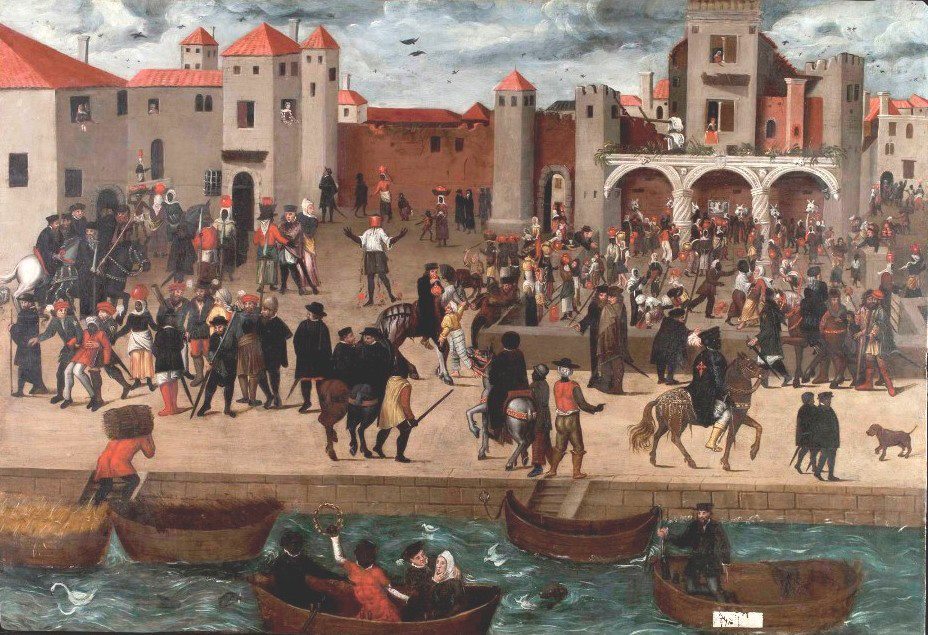 Renaissance Lisbon was home to the highest percentage of blacks in Europe at the time, ranging in status from slaves to knights. This reality is reflected in an unusual painting made by an unknown artist, probably from the Netherlands, of the Lisbon waterfront in the late 16th century, where blacks and whites from a variety of social strata co-exist in a public square. I suspect the blacks on horse back of military baring are Kongolese upper classes who joined the Knighthood some of the others may well have been slaves and middle class trader types, the slaves were not necessarily Kongolese mind you, if this is from 1570-80..keeping in mind that very strong ties were made with the Kingdom of the Kongo and Portugal during that era. You can follow this link if you want. http://www.artnews.com/2012/10/25/image-of-africans-in-western-art/ 1 Like |
| Re: The Kongo Kingdom...A underrated Kingdom by Nobody: 1:20am On Mar 24, 2013 |
Bump...  1 Like |
| Re: The Kongo Kingdom...A underrated Kingdom by RandomAfricanAm: 8:20pm On Mar 25, 2013 |
Fantastic write up! You also have some pieces I haven't seen or at least haven't seen in color. I need to do some more reading on the kongo. Princibly looking at it's earlier foundations and relations with surrounding people. I'm more interested in African societies independent of substantial forign influence . I have some info you may like as well. |
| Re: The Kongo Kingdom...A underrated Kingdom by Nobody: 8:27pm On Mar 25, 2013 |
^^Thanks! And please do share. |
| Re: The Kongo Kingdom...A underrated Kingdom by RandomAfricanAm: 7:33am On Mar 26, 2013 |
CHAPTER V LAW The Family. - Marriage.-Contracts. -Property. -Crimes and Punishments.-Judicial Procedure. NATIVE LAW THE subject of African Law is a fascinating one and I am tempted to enlarge on it, the more so as it is but little understood in England, although a knowledge of it is clearly essential to the right governance of our black fellow subjects. Miss Kingsley has treated of African religion and law in her West African Studies (abridged edition), among other writers may be mentioned the late Sir. A. B. Ellis, Sir J. Smallman Smith, and Mr. J. W. Sarbah in addition. Much material has of course been pigeon-holed by various officials. But, able though the English works above mentioned are, they do not go deep below the surface, and are far from being text-books of native customary law, to which the administration can turn for guidance. Our French neighbours, wise in their generation, have recently issued a monumental work, Les Coutumes indigènes de la Côte d'Ivoire by Clozel; and a similar work on the native law of Nigeria compiled by a trained anthropologist who can give his whole time to his work would undoubtedly be of extreme value, not only to the student of comparative jurisprudence, but to the official who comes in daily contact with men who know only the native law, whose life is regulated by its fundamental principles, and who can be governed only if the English ruler recognises those principles and deals out even handed justice in accordance with them. In some primitive communities there is only one sort of offence which can be regarded as law-breaking Dr. Codrington shows that in Melanesia tabu takes the place of law; the infraction of a tabu may bring down on the head of the offender an automatic penalty; but he may be too strong spiritually; and then the penalty falls upon the innocent. To provide against this, the society itself of which the offender forms a part inflicts the penalty for wrong doing and thus satisfies the power whose wrath is incurred by the infraction of the tabu. Just in the same way in Africa a violation of the moral law, if I may so term it, is an affair for the whole of the community. If Nzambi, on the Kongo, is provoked by immorality especially of a sexual kind, the result, as we shall see in a later chapter, is drought, and the penalty falls on the community. A violation of the moral law is in native phraseology a "God palaver"; any outrage on a spirit may be of this nature but in practice a man is left to settle his own account with a minor spirit, which is hardly powerful enough to inflict damage on a family or tribe. On the Congo, justice is so far organised, where "god palavers" are concerned, that punishments are inflicted by the Badungu acting on the orders of the king. "Man palavers," on the other hand, or in our phraseology, Civil and Criminal Cases (for they are identical in Africa, the fundamental idea being that a debt of some sort has been incurred) are decided by a court of justice, which bases its decisions on precedents, but the judgment must be enforced by the winner of the case, aided it may be, by his family. It is not the business of the king or of any official to see that justice is done; when once judgment has been given and recognised by the people, generally the matter passes out of the hands of the state and becomes a private affair. If the loser is strong enough to resist payment the palaver becomes a trial of strength between the two families and may become a "war palaver"; in any case the palaver and its consequences, in the shape of liabilities to pay and right to receive, are handed down in the respective families, like any ordinary debt, until such time as the winner of the case is in a position to enforce payment. If the loser cannot resist, he must pay the debt or in default become a serf or pawn in the hands of the creditor; failing him, a member of his family, or an inhabitant of his town or district, loses his freedom. This service is not a setoff against the debt; the pawn is held until the debt is paid in legal currency; though a debtor may become a slave if his family has died out or dies out before the debt is paid; slavery, however, being regarded as a disgrace, the family would as long as it subsisted, endeavour to release one of its members. The intimate connection between the spheres of law and religion or magic cannot be better illustrated than by the fact that the weaker party to a suit calls in the help of nail fetishes. The form of the following notes is dictated by the form of the questionnaire-issued by the French authorities-to which it was originally an answer, and it must be read in the light of the foregoing note. |
| Re: The Kongo Kingdom...A underrated Kingdom by RandomAfricanAm: 7:33am On Mar 26, 2013 |
Section I.-Of the Family. The organisation of the family or Xifumba is certainly one that the Bavili need not be ashamed of, and when compared to that of many civilised peoples can only be looked upon as a model of logical compactness. The Xifumba is composed of the four grandparents Nkaka, the father Tata, the mother Mama, their children Bana, grandchildren Batekulu, great-grandchildren Ndandu, and great-great-grandchildren Ndalula. The uncle on the mother's side is called Ngulinkaci, the aunt Mama. The aunt by marriage is called Mama. The uncles and aunts on the father's side Tata. Brother or sister-in-law Zali. Father or mother-in-law Nkwekici. Son or daughter-in-law Nkwekici. Uncle of mother Xikweci. Uncle of father Xikweci. When you ask a native to what family he belongs he will answer you by giving you the name of his mother's family. On the death of the father his brother takes care of the children; but the wife remains with her children sorrowing for her husband for at least twenty-four months, when she may marry again. These children are called bana bana ba bika nkulu. (The little children left by the spirit.) A man may not marry any of his mother's family or relations whom he terms Mama. If the Xina of the girl the man wishes to marry is that of his mother he cannot marry her. He may not marry the children of his father's brothers, but those of his father's sisters are not forbidden to him. The family forms a part of the higher organisation of the tribe. Each individual belongs to a family; each family is under a chief called Kongo Zovo, and this chief is under the prince of the province containing these families, who is called by the name of his province preceded by the prefix Ma, short for Manifamu. Seven of these provinces hold the people of Luango, called the Bavili. The Bavili, under their king Maluango, form a third part of the kingdom of Kongo, or the Fjort people, who are a section of the Bantu race. My head man Tati for example is of the family of Yanga of the royal province Buali of the Bavili of the KONGO kingdom of the Bantu race. An individual may not leave his town without the permission of his father or of the Kongo Zovo, and upon his return he must present himself before him, to give an account of himself and show the proceeds of his fishing, hunting, or trading. He must obey and respect his chief, who may tie him up, chastise him, deprive him of food, but has no power of life and death over him-this right belonging in law only to the King Maluango. The Kongo Zovo can also requisition the services of all his family. |
| Re: The Kongo Kingdom...A underrated Kingdom by RandomAfricanAm: 7:34am On Mar 26, 2013 |
Section II.-Marriage. We find the highest form of marriage to be that of Monogamy. That is to say Princesses whose offspring may become the future rulers of the kingdom, may not have more than one husband, whom she has the right to choose. He may be already married or not, but once selected he must put away his other wives and become the slave of the princess, who has the power of life and death over him. But when she dies this man inherits all her property. Maluango so long as he is simply Nganga NVUMBU[1] may have as many wives as he pleases, but once he has been crowned Maluango he is supplied with one wife, a princess of Ngoio (Cabinda in Kakongo) and must put away the others. The people generally are polygynists, but there is a line drawn between the first wife and the others. The first is called Nkaci Ntete, the second and others Nkaci Sialila. A concubine is called Ndâia Xicinsu. An unchaste woman Ndumba. Polyandry has not the legal character that it has among certain primitive peoples. With regard to Polygyny and its effect upon the condition of the woman, it is true that, apparently, certain women have always existed in this country who object very strongly to sharing a husband with others, and such are said to be bad women or women of spirit, Muntu 'Mbi. But as a rule the first wife asks her husband for women to help her in her work, and such a woman is called a good woman or creature, Muntu 'Mbote. There are constant quarrels among these wives, but the husband refuses to take sides, and would be looked upon as a fool if he interfered. Should the injured woman in these disputes appeal to an outsider or judge, as an arbitrator, he will refuse to have anything to do with it. She has no appeal in these matters. Mankind generally treats the affair with indifference. Should a man promise to marry a girl, she can make him pay very heavily for breach of promise if he has touched her; if not, she can only slang and shame him. The man, however, cannot claim anything from the woman who breaks off an engagement, but she gets a bad name. If the woman whom the man desires to marry is past the age of puberty and is able to judge for herself as to a man's parts, the man will first address himself to her. If the girl is still a child he goes to her father and mother in the first place. The proposal made, the father and mother discuss the matter. [1. High priest.] If they can find no objection to the young man and they think it well to allow their daughter to marry, they accept the young man's offer. The young man then approaches his own parents and if they do not object, the mother, who keeps her son's savings for him, gives him the goods necessary to present to his future father and mother-in-law. These goods are given to the girl's parents in order to give the man a hold upon them in case they supply him with a worthless article as a wife. It covers their responsibility, which is a very great one, and gives the father the right on the other hand, after returning the exact amount presented, to take his daughter away from the husband, should he turn out to be a beast and ill-treat her. There are two "marriage bundles": (1) Bukali in the olden days, 20 longs (say 10 francs) but now 100 longs and one demijohn of rum (say 60 francs). (2) Mpakete, in the olden days 10 longs, but to-day consisting Of 50 longs and one demijohn of rum, 1 coat, 1 counterpane, 1 hat, 100 longs to mother's relations, and a present of 50 longs to the bride. Certain families may not intermarry, as those of Xibanga and Maluango. Intertribal marriages were once totally prohibited, but to-day marriages take place although the offspring of such unions are looked upon much in the same prejudiced light by the Bavili as the offspring of black and white races are looked upon by the Europeans. A woman who cannot plant is not allowed by her parents to marry. A known fool will not be accepted, and sickness is a bar. The goods bestowed on the parents of the proposed wife are called goods for marriage, Bindele Bi Kukwela, and not goods for barter, nor can the marriage be properly termed a marriage by purchase. The goods are accepted as a gage, or pledge, not as purchase money. The "Bundle" having been given to the assenting parents, when the time comes or the girl arrives at the age of puberty, the bridegroom sends money to the parents so that the girl may be placed in the "paint house," where she undergoes certain rites of purification. The father's women folk then take the girl to the water and the Tukula or red paint is beaten off her with pliant switches or twigs. Then she is dressed and adorned with leg and arm rings of brass, necklaces of coral and other ornaments and taken to the expectant bridegroom. The dancing and singing that has commenced after the washing maybe continued during the whole night. The husband gives certain presents to the father's relations who have brought him his bride. The next morning the husband presents his wife with a white handkerchief. Then the women again come and present the couple with food. The husband makes them a return present and the bride returns to her father's house. The husband then sends his father and mother to his father-in-law with a present to ask him to send him his wife. The father-in-law marks a day for her return to her husband, and gives certain presents to the father and mother of the husband, who return to their village. Upon the day mentioned the father-in-law takes his daughter back to his son-in-law with a present. Then in the presence of the husband's father and mother he exhorts him to follow in his good father's footsteps, then turning to his daughter he gives her good advice and hands her over finally to her husband. The married couple now. have two fathers and two mothers to whom they owe obedience and whom they must treat equally as members of one family, helping them all as children are expected to help their parents. Should the woman be guilty of adultery the man may forgive his wife the first offence, but on the second occasion he will return her to her father, who must return the " pledge " money given to him. Should he discover the guilty man he may ask what indemnity he likes, and that man has to pay the fine even if he has to pawn himself as a hostage. The first time the husband is caught by the wife he may be forgiven, but the next time the wife reports the matter to her husband's parents, and the man must pay. She may leave him for a time, but generally comes back to him. If not, and should it happen that the father finds her another husband, the pledge goes to her first husband. But the husband cannot make her father give back the original pledge. The. wife has no claim on the woman who has committed adultery with her husband. The male adulterer pays the fine, the husband alone inflicts it, and the amount is generally about equal to the pledge, but the actual amount rests with the husband. As regards the duties of married persons, the woman plants, cooks, carries wood, and draws water; the man looks after the religious and fetish rites of the family, closely allied to the treatment of his sick relations, and their burial, finds his wife in dress, fish, the chase, palm nuts, etc., builds her house and cuts the bush where she may have decided to plant. Divorce.-Apart from the causes already mentioned, long absence and non-support bring about divorce or dissolution of marriage. In this case the wife, after having waited, say twelve months, for the return of her husband, seeks his father and mother and puts the situation before them. They advise her, and if they give their consent she goes back to her father and may re-marry. Upon the reappearance of the first husband the "pledge" is returned to him. So that divorce is looked upon as a family matter. In the event of the parties being unable to agree, the father returns the " pledge " and they are free to marry again. If the children are very young they go with the mother, but the daughters remain with the mother in any case, while the sons when old enough to do without the mother's care go to the father. The father has to do his part in sustaining the children. |
| Re: The Kongo Kingdom...A underrated Kingdom by RandomAfricanAm: 7:35am On Mar 26, 2013 |
Section III.-Concerning Relationship. The different kinds of relationship are as follows:- 1. Their own children. Bana bana na veka. 2. The children of their elder brother. Bana ba ya yandi. 3. Their brother's children. Bana ba nkawmba andi. 4. Children of their uncle. Bana ba mama'ndi nkaci. 5. Children of their grandparents. Bana ba buta kak'andi. 6. Children of the father's sister. Bana ba nkaci. 7. Children of his nephew. Ntekulu u buta muana nkaci. 8. The children in pawn. Buti ci xivili i vanina. 9. The bought slaves. Ndongo i sumba. 10. The children of slaves. Bana ba xifula. The native law does not adopt the distinction of our civil law between legitimate, and natural children recognised by the father or otherwise. Birth sanctifies the child, and, as the child of its mother, it may become the inheritor of its uncle's property. As regards the general rule of succession it is not the eldest son but the wisest that inherits the property. But where the father of a family has been neglected by his relations, he sometimes takes his revenge on them by dividing his property among his children while he is yet alive. The mother has no property of her own, but is the guardian of that of her children, and should they die this goes to her family. Both the father and mother watch over the interests of their children, and can punish them. The mother alone has the right to pawn her child, but she must first consult the father, so that he may have the chance of giving her goods to save the pledging. The father cannot pledge his child. The brother can pawn his sister, or the uncle his niece, the mother being dead. But the father being alive the uncle must go first to him to give him the chance of helping him out of the difficulty by means of a loan of goods. If the uncle is what they call a bad man, the father will call witnesses to see the cloth that he is lending the uncle who would pawn his child, he takes up a kernel of the palm nut in their presence and drops it into his box; which being interpreted means that he has bought his daughter. Until this debt is paid to the father the uncle cannot raise the wind on that child again. A person is never free from being pawned in this way. Parental authority is really never lost, for the father has always the right to ransom the child, who never ceases to look to him as its father. But as the child often settles down in the village of its pawnee and becomes the parent of children, the amount needed to ransom it increases in proportion to the child's offspring. The debtor has to pay double the amount he borrowed and so much for every child. Even then the child may elect to remain where it is. A child or children bereft of all family ties may be adopted by one of the father's friends, who calls it or them (Muana bika wali) the child my friend left. Under this kind of artificial parentage the adoptor can neither sell nor pawn this child, nor has he any hold on its earnings; it is a work of love and honour, but he looks to the gratitude of the child to make it up to him in some way or other. |
| Re: The Kongo Kingdom...A underrated Kingdom by RandomAfricanAm: 7:35am On Mar 26, 2013 |
Section IV.-Of Guardianship, of Emancipation, and Prohibition. The French law recognises four kinds of guardianship: 1 That of the survivors of the fathers and mothers. 2. That by will conferred by the fathers or mothers dying last. 3. That of the next of kin. 4. That which is disposed of by a meeting of the family. The Bavili recognise six forms of guardianship, in order: 1 The grandfather. Xinkaka xi andi. 2. The father's family. Xitata. 3. The mother's father. Xinkaka xibuta. 4. The mother's family. Mama ci andi. 5. The father's friend. U,yukani tatitu. 6. The guardian appointed by the family. Nandi u yonzola muana u bika vumbi. The guardian acts as a father to the child, but cannot touch its property, for, as already shown, that belongs to the mother's family. He is paid by the family upon delivering up the child according to his deserts,-whatever he asks for if all has turned out well, with little except shame if badly. The family are the judges as to the time when the child shall be taken from its guardian, and that is generally when the child has grown up to manhood or womanhood. As the child's pro-father all that it has- earned is his, or as much thereof as he likes to take. |
| Re: The Kongo Kingdom...A underrated Kingdom by Nobody: 5:55pm On Mar 26, 2013 |
^Wow! Nice posts. 1 Like |
| Re: The Kongo Kingdom...A underrated Kingdom by odumchi: 4:56am On Mar 27, 2013 |
What a refreshingly different thread. 2 Likes |
| Re: The Kongo Kingdom...A underrated Kingdom by PhysicsQED(m): 10:47am On Mar 27, 2013 |
It's true that the kingdom of Kongo is underrated, but I think that this is mainly by those who haven't bothered to read about it. I also think that the modern awful situation of countries in that area of west central Africa and modern brainwashing and stereotyping about what levels of organization/development Africans in general had achieved in the past is partly responsible for the misconceptions as well, not just a lack of reading. For more on the kingdom of Kongo, the work of the historian John Thornton - who has published several articles and two books on specific historical periods of that kingdom - is probably a good source. The articles of his on the Kongo that I have read are excellent so the books are probably of similar quality. Thornton's article in the book Africa's Urban Past (a very good book, by the way), "Mbanza Kongo/Sao Salvador: Kongo's Holy City" is pretty informative: http://books.google.com/books?id=0IwMwBVfr0sC&pg=PA67&lpg=PA67 I do have to say one other thing though. On a less positive note, Kongo would probably be rated more highly as a historic kingdom today and get the perception that its early history deserves if it were not also rightly seen as a kingdom that was a bit too willing to adopt European ways and let itself be co-opted by (and ultimately ruined by) Europeans. 1 Like |
| Re: The Kongo Kingdom...A underrated Kingdom by Nobody: 2:53am On Mar 28, 2013 |
odumchi: What a refreshingly different thread. Thanks. |
| Re: The Kongo Kingdom...A underrated Kingdom by Nobody: 2:53am On Mar 28, 2013 |
PhysicsQED: It's true that the kingdom of Kongo is underrated, but I think that this is mainly by those who haven't bothered to read about it. I also think that the modern awful situation of countries in that area of west central Africa and modern brainwashing and stereotyping about what levels of organization/development Africans in general had achieved in the past is partly responsible for the misconceptions as well, not just a lack of reading. I may have to pick up that book. |
| Re: The Kongo Kingdom...A underrated Kingdom by RandomAfricanAm: 8:05pm On Mar 28, 2013 |
Section III.-Concerning Relationship. The different kinds of relationship are as follows:- 1. Their own children. Bana bana na veka. 2. The children of their elder brother. Bana ba ya yandi. 3. Their brother's children. Bana ba nkawmba andi. 4. Children of their uncle. Bana ba mama'ndi nkaci. 5. Children of their grandparents. Bana ba buta kak'andi. 6. Children of the father's sister. Bana ba nkaci. 7. Children of his nephew. Ntekulu u buta muana nkaci. 8. The children in pawn. Buti ci xivili i vanina. 9. The bought slaves. Ndongo i sumba. 10. The children of slaves. Bana ba xifula. The native law does not adopt the distinction of our civil law between legitimate, and natural children recognised by the father or otherwise. Birth sanctifies the child, and, as the child of its mother, it may become the inheritor of its uncle's property. As regards the general rule of succession it is not the eldest son but the wisest that inherits the property. But where the father of a family has been neglected by his relations, he sometimes takes his revenge on them by dividing his property among his children while he is yet alive. The mother has no property of her own, but is the guardian of that of her children, and should they die this goes to her family. Both the father and mother watch over the interests of their children, and can punish them. The mother alone has the right to pawn her child, but she must first consult the father, so that he may have the chance of giving her goods to save the pledging. The father cannot pledge his child. The brother can pawn his sister, or the uncle his niece, the mother being dead. But the father being alive the uncle must go first to him to give him the chance of helping him out of the difficulty by means of a loan of goods. If the uncle is what they call a bad man, the father will call witnesses to see the cloth that he is lending the uncle who would pawn his child, he takes up a kernel of the palm nut in their presence and drops it into his box; which being interpreted means that he has bought his daughter. Until this debt is paid to the father the uncle cannot raise the wind on that child again. A person is never free from being pawned in this way. Parental authority is really never lost, for the father has always the right to ransom the child, who never ceases to look to him as its father. But as the child often settles down in the village of its pawnee and becomes the parent of children, the amount needed to ransom it increases in proportion to the child's offspring. The debtor has to pay double the amount he borrowed and so much for every child. Even then the child may elect to remain where it is. A child or children bereft of all family ties may be adopted by one of the father's friends, who calls it or them (Muana bika wali) the child my friend left. Under this kind of artificial parentage the adoptor can neither sell nor pawn this child, nor has he any hold on its earnings; it is a work of love and honour, but he looks to the gratitude of the child to make it up to him in some way or other. |
| Re: The Kongo Kingdom...A underrated Kingdom by Nobody: 9:23pm On Mar 29, 2013 |
Only a fool will put Bantu and savagery in the same sentence. Op nice job keep it up thanks. 1 Like |
| Re: The Kongo Kingdom...A underrated Kingdom by Nobody: 1:00am On Mar 30, 2013 |
CAMEROONPRIDE: Only a fool will put Bantu and savagery in the same sentence. Op nice job keep it up thanks. Thanks and you welcome. |
| Re: The Kongo Kingdom...A underrated Kingdom by RandomAfricanAm: 8:18pm On Mar 30, 2013 |
Section V.-Concerning Property. The best general idea that can be given of the native theory concerning property is given in their own words (Li kanda li ami) "my family," literally Kanda means to make straight, to tighten-Nkanda equals skin, i.e., the natural part of man, or that part which he has in common with animals. As the saying goes, Muntu nkanda, xibula nkanda, muntu ua vioka mu ku bula mbembo. Man is of skin, the cattle are skin, man is only superior by speech. The right of property is derived through the mother, the planter, to the Great Uncle the giver of all good gifts, Mbunzi, the W. wind, the rain giver, one of the Bakici baci or primeval " powers " on earth. The Bavili have no word in their language to express proprietor or property. The nearest expression for proprietor is Fumu Bima, the chief or prince of all things. He may possess (Baka vua) money or goods (Mbongo) or things (Bima) or even land, Ci, but as Fumu ci, the land chief, he is the head of a family holding the land in trust for his people; while a possessor of goods is really a man who is only the temporary owner of things that belong to his Fumu. Both kinds of goods, movable and immovable, have their uses, but one remains (Ci, i.e. the land), the other gets used up (Ma). The difference may be best explained by the words themselves, thus Ci has the meaning of primeval matter, the earth (Nci), while the primeval Ma or Mad equals water. Wherever labour is implied the possessor has the right of the disposal of its fruits, or that part of it which his Fumu has given back to him or allowed him to keep. A man trades, the part allotted to him is his. The woman plants, that part which remains after feeding her husband and paying the tithes to the Fumu may be said to be hers. The plantation is hers on this understanding. That is to say, all sources of wealth carry their responsibilities with them, and all goods are rather in trust than actual possessions. The right of usufruct is granted to the Kongo Zovo by the Prince, or to the individual by the Kongo Zovo, on demand, and this may be for him and his descendants so long as they exist as a family, but no use or habitation gives a man the right to ownership. This usufruct may have been granted in the first place by right of birth, as a reward for service rendered, or on payment by a rich man on the extinction of the family on whose land he has been living. And just as the king of the country may depose the prince of the province, so the prince may take away this usufruct from a rebellious Kongo Zovo. The Kongo Zovo in his turn may revoke the usufruct of land or goods enjoyed by the individual. Usufruct may be established by inheritance, gift, loan, and permission, on land, water, cloths, goods, fruit of the soil. The Kongo Zovo has the use of the land and water for his family; in return for this (1) he must help the prince in his wars with armed men; (2) all leopards killed on the land must be sent to the prince; (3) the head and a leg of the antelope, the wild ox, and the pig killed must also be sent to him; (4) the backbone of any whale washed ashore, the heads of the sea fishes called Bafu, Ntala, Nqueci, Mbili, Mbuta, Muenji, Tobo; the water pig Ngulu Maci, and a small basket of fish from each net, must also be sent to the prince; (5) his women also must send him one-fifth of the palm nuts, and a basket of pea nuts and Indian corn harvested; (6) the rich man or Esina living upon the property is expected to give the prince a feast and presents every year. In return for a gift of cloths or the loan of goods the recipient is expected to be at the beck and call of the one who gives, although he has no right to claim service. The receiver calls this man "my friend who gives me cloths to wear every day." U yukana yami u kalila u mpuika nlele kada xilumbu. Those who are permitted to cut down the palm nuts or reap any of the unplanted fruits of the soil are rewarded by a certain share in the profits of their sale. The usufruct comes to an end by the will of the prince, the Kongo Zovo, or the individual, although it is granted generally to the recipient and his successors so long as they exist and behave themselves. I have explained the duty of the individual to the Kongo Zovo, and of the Kongo Zovo to the Prince; there remains that of the Prince to the King. Maluango, as prince of the province of Buali, enjoys the same revenue as the princes of the other provinces, but as King he sends his messages to the princes to demand their aid in any emergency. He demands men in case of war, goods in case of need when one of the " powers " or Bakici baci have to be appealed to. The Prince must send him the skins of all animals killed, three pieces of chalk, 100 longs (or 50 francs goods), three saga ngo, and three mbongo lu tumbu or native money mats. Roads running from the villages through the lands granted to the Kongo Zovo to the main roads are called Nzila Zi Nyawna, and are of a private nature, that is to say a stranger may be asked if met where he is going to, and if his reply is satisfactory he is allowed to proceed, if not he is asked to go by the public road, or Nzila Ivanga Nzambi, or God-created road. These latter roads cross at Buali, the sacred and central province of the Bavili or Luango. The east road leads to the country of the Batetchi, and is called Nzila Xintetchi, the west leading to the sea, Nzila Mbu, the south, Nzila Kakongo, the north road, Nzila Balumbu. These are partof the public lands, as are also the sacred groves (Bibila), lakes, lagoons, rivers, bush, and ownerless lands. Fishing, hunting, trees, native string, reeds, and the fruit of the soil not planted by the hand of man are common to the natives of the country. The King holds the whole country in trust from God, through the "powers," for the use of the people. White men may on certain conditions become users of the land and that which grows on it. The white man wishing to occupy land applies to the Kongo Zovo, who marks off the land put aside for his use. The white man then compensates the Kongo Zovo for his loss of use of the land, and the family for loss of use of the trees, etc. In the meantime the Kongo Zovo has warned the prince, who sends his Mafuka, Maxienji, and Mangova to visit the white man and witness the act of self-sacrifice on the part of the Kongo Zovo. They supply the white man with an interpreter, to whom they give the title of Mafuka or messenger. This man watches the interests of the white man and the prince conjointly. When the white man has returned the prince's messengers with small presents and has settled down a little, the prince, accompanied by his Mambuku, Mamboma, Mafuka, Maxienji, and Mangova and followers, comes to visit him officially. The white man has to supply these six personages with chairs or stools, and should place upon the prince's chair a piece of checked cloth called the cloth of law. The prince then bestows the land upon the white man and his successors. Thereupon the white man takes a position in the country equivalent to the Kongo Zovo, but instead of paying the prince in flesh and fish or the products of the soil, pays the prince so much in goods half yearly or yearly, as well as a certain small percentage on the produce he buys. |
| Re: The Kongo Kingdom...A underrated Kingdom by Nobody: 2:37am On Apr 03, 2013 |
I've been reading this thread for the last 30 minutes. I am very appreciative of this thread sir. Most ppl tend to be stuck on west african history but never talk about central africa which has it's own rich history and has left its mark in the new world in places like the caribbean and latin america..esp. Brazil, Haiti-DR, Cuba, and Jamaica.  I am proud to be a descendant of these people.  Here is my contribution. https://www.youtube.com/watch?v=5eYMh37BEMk Its interesting that we are not taught that the kings literally called the shots not only as far as his people were concerned by also Europeans who literally bowed before him. (him = all kings of that region). Central Africa was the hardest to penetrate not only because of the geographical features but also the fierceness and no-nonsense characteristics of the people. It wasn't until the Kongo ppls were tricked that they fell to the Portuguese. by tricked i mean them sending their best men for what they thought was indentured servitude but in reality was total enslavement. 1 Like |
| Re: The Kongo Kingdom...A underrated Kingdom by Nobody: 2:38am On Apr 03, 2013 |
sorry for the huge pik.  [size=28pt]Nzinga!![/size]   1 Like |
| Re: The Kongo Kingdom...A underrated Kingdom by Nobody: 2:39am On Apr 03, 2013 |
odumchi: What a refreshingly different thread. agreed. this is what the culture section should be about. i've been gone, came back and see the same tired threads  #geeze!! anyway, good job OP!!  |
| Re: The Kongo Kingdom...A underrated Kingdom by Nobody: 2:57am On Apr 03, 2013 |
MsDarkSkin: Thank you.  I am glad everyone is enjoying this thread. 2 Likes |
| Re: The Kongo Kingdom...A underrated Kingdom by Nobody: 3:05am On Apr 03, 2013 |
no problem sir  i'll try to help update it whenever i have free time.  |
| Re: The Kongo Kingdom...A underrated Kingdom by Nobody: 3:06am On Apr 03, 2013 |
[i][/i] MsDarkSkin: no problem sir you should also check out this thread I made. https://www.nairaland.com/1241171/african-elites-india 1 Like |
| Re: The Kongo Kingdom...A underrated Kingdom by Nobody: 3:08am On Apr 03, 2013 |
KidStranglehold: you should also check out this thread I made. will do.  |
| Re: The Kongo Kingdom...A underrated Kingdom by RandomAfricanAm: 8:26pm On Apr 04, 2013 |
Section VI.-Of Successions, Gifts, and Wills. On hearing of the death of a person all his relations come to "weep." The wife of the deceased delivers the key of the house, where the wealth is, to the man she knows in the absence of any will to be the rightful inheritor. These are -1. The brother of the deceased by the same mother. 2. Then the nephew by his sister. 3. The relations of his mother. 4. Failing these, his child. The wife he has loved and esteemed the most is the guardian of his wealth and the keeper of the key, but she inherits nothing. The natural inheritor cannot repudiate his succession; he must take over the debts, not being able to renounce the inheritance. When about to bury the deceased the inheritor plants a sword in the ground, before the assembled guests, and asks if there is anything more to be paid by him on behalf of the deceased. Any creditor present then goes up to the sword and placing his hand upon it declares that the deceased owes him money or goods, and that he will give particulars of the debt later on. These are considered as proved. Any creditor claiming his money after that must bring his witnesses, and be prepared to substantiate the debt. The wife generally knows all about the debts of her husband. The wife mourns for her husband (or did) for 18 to 24 months after death; the burial of her husband often taking place about that time. The members of the family generally help to pay the expenses of the ceremonies in connection with the death of the Kongo Zovo; they then stay with the inheritor or disperse to the families of their mothers. They inherit nothing from the Kongo Zovo except by will. A man may give away his property during his life, or make his verbal will in the presence of his wife and witnesses. He will call his slaves and tell them that they have been given to so-and-so. Or he may call his children and let them choose their slaves or goods. But this is seldom done, and only to spite the family of his people who may have behaved badly to him. The gift is made in the presence of witnesses, and is revocable until the death of the giver, if it is to take effect only after death. But a simple gift between the living is irrevocable. There are no special forms to be observed when a will is made; it is held to be written in the heart of the wife who has the key. The wife and the witnesses are the executors of the will. The family will often make the widow pass before their fetishes and swear that she is keeping nothing back. They sometimes go further and force her to take "casca"[1] as a test of her honesty. There can be no revocation of the last will, the matter rests with the wife and witnesses once the husband is dead. |
| Re: The Kongo Kingdom...A underrated Kingdom by Nobody: 10:40pm On Apr 04, 2013 |
Got some interesting info. on Kongo Kingdom's influence in the new world.  will post later.  |
| Re: The Kongo Kingdom...A underrated Kingdom by Nobody: 11:26pm On Apr 04, 2013 |
Cuba.  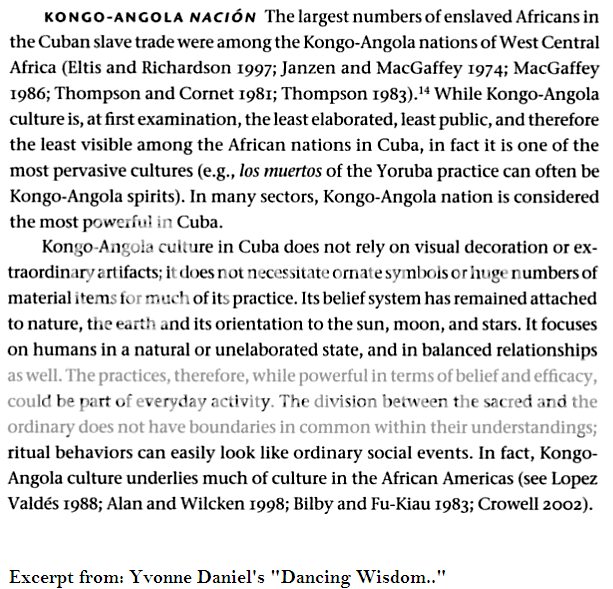 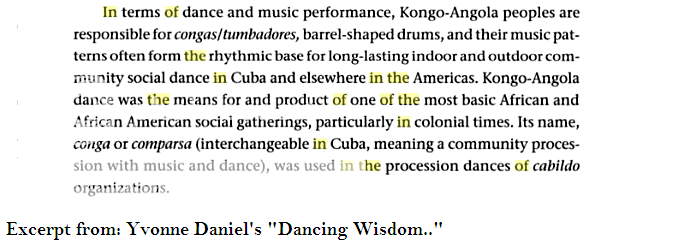 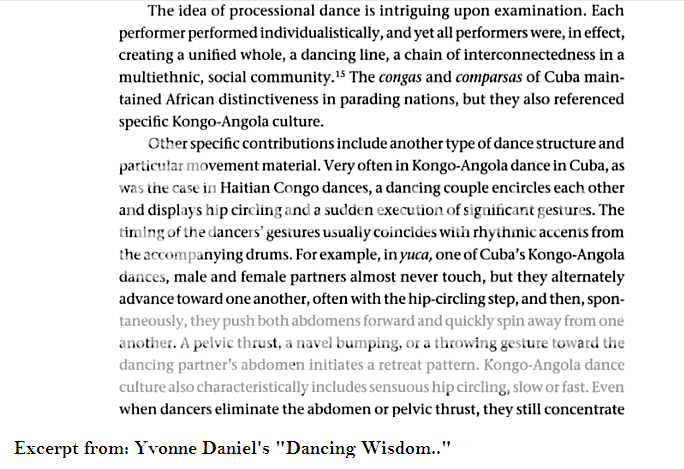 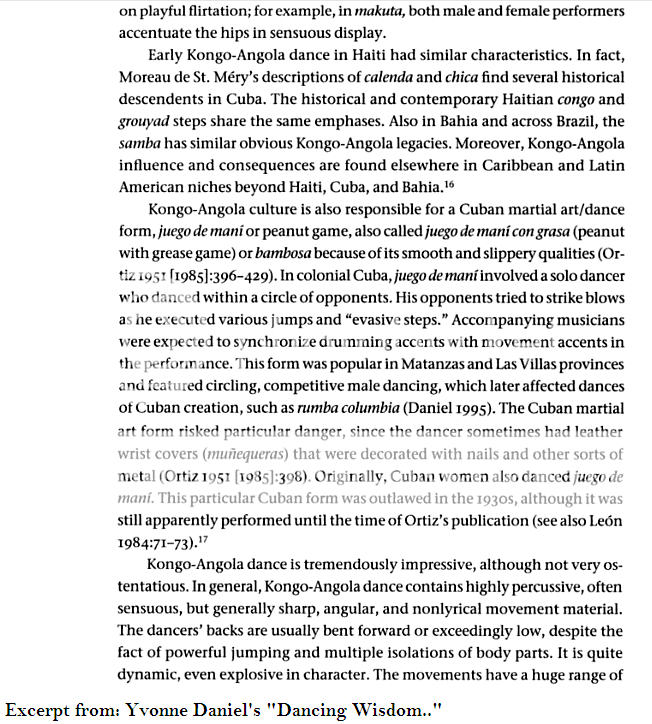 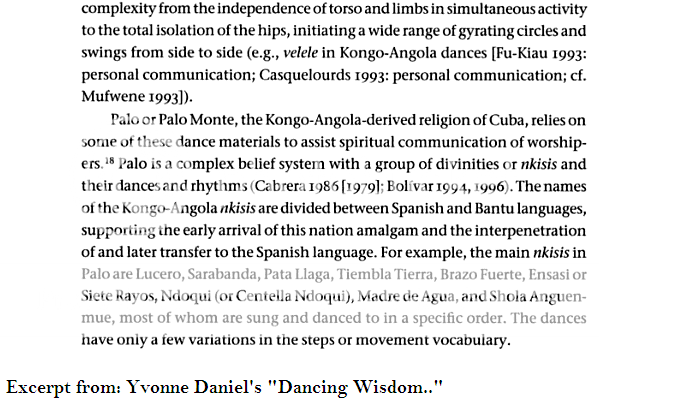 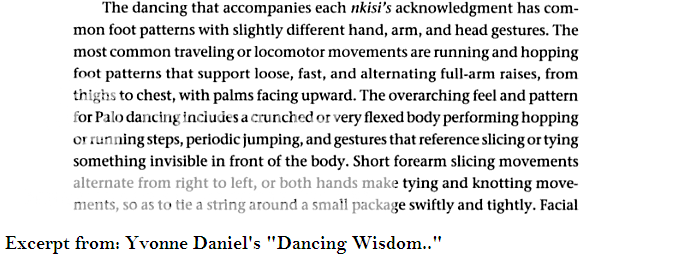 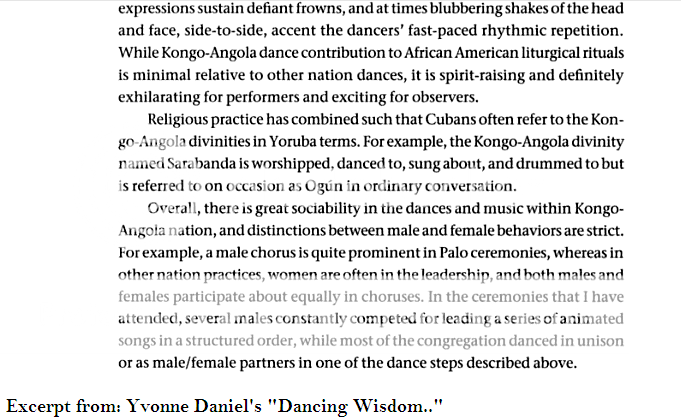 too lazy to type it out...  2 Likes |
Okwu Ntabi Ile / Any Regret Not Knowing How To Speak Your Dialect? / Ooni Appoints Adediwura As New Obalufe (Photo)
(Go Up)
| Sections: politics (1) business autos (1) jobs (1) career education (1) romance computers phones travel sports fashion health religion celebs tv-movies music-radio literature webmasters programming techmarket Links: (1) (2) (3) (4) (5) (6) (7) (8) (9) (10) Nairaland - Copyright © 2005 - 2024 Oluwaseun Osewa. All rights reserved. See How To Advertise. 196 |